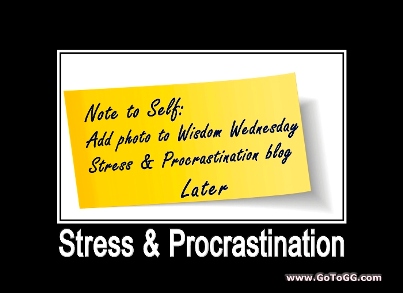Stress and Procrastination
The Relationship between Stress and Procrastination
A Wisdom Wednesday Blog

Recently, I had the opportunity to observe how procrastination – putting something aside to complete later, impacts your stress.
This is a lesson that I thought I had already learned, but sometimes our behavior or the behavior of others on whom we depend impacts us in ways that are frustrating and harmful to us. Stress can be a negative factor in your health and certainly unpleasant to experience.
Sometimes stress is completely unavoidable. When that happens, I am compelled to use meditative and visualization techniques to return, hopefully quickly to a state of equilibrium.
At other times the pounding heart, the on edge feeling of too much adrenaline in the system, the vague tension of an impending headache is the penalty that life extracts from faulty planning and procrastination. I don’t know about you but I hate to be late. I hate to miss a deadline even if it is only a “soft “or self-imposed deadline. When it is a deadline imposed by events in the world, the stress of missing it is dramatically increased.
The hands of time move forward in life without regard for your position in the plans of your life. No matter how we try, we cannot ever change the impact or influence of what we have done in the past, or what we have left undone in the past. Once a situation or event becomes the past, it releases us from any mistakes we may have made or disappointments we may have suffered. As freeing and comforting as this is it is also significant to observe recent events to see what you can learn from what has happened so you can avoid whatever was stressful, uncomfortable or unpleasant in the future.
It is after a stressful work experience that resulted in a missed deadline and accordingly diminished effectiveness and success that I am writing today, trying to learn what I can do better and more effectively in the future. In exploring what I can do to avoid the discomfort of too much stress that resulted in dis-ease I realized that often the culprit creating stress is a direct result of procrastination, although it fortunately did not create disease.
The impact that procrastination has on your level and experience of stress can be significant.”
– Genevieve Gerard
Procrastination results in a backlog of unfinished events that often result in feelings of being overwhelmed. Ironically, it often takes much more time and effort to bring a task to completion than it would have in present time. To complete a procrastinated project you often must review what you have previously started to bring it into the current situation and circumstance.
This is not always an issue, but when working on multiple projects with any time or external deadline significance I find the time at hand sometimes expands by at least a third, how much work needs to be done to accomplish a single project. Therefore, the procrastination has ultimately increased your workload and as a result has increased the stress that you experienced. That does not even take into account the fact that until a task is concluded it remains a small pressure in the back of your mind, increasing your sense of stress and your tendency to feel like it is all too much, overwhelming and frustrating.
This pattern of choice compounds your stress and reduces both your effectiveness and efficiency. Like the old time management axiom advises that you handle an individual piece of paper only once, procrastination deprives you of the satisfaction and feeling of success that finishing a task brings.
Yes, it is true that there are always more tasks to be addressed in the ongoing adventure of life, but bringing a task to completion actually reduces the volume of work required since you don’t have to revisit where you were before when you placed the task in the “I’ll do it later” pile. Soon, that pile becomes so high that, prior to beginning any task you have to prioritize your tasks amongst all of the procrastinated tasks. You may feel pulled into too many directions and the constant need to re-evaluate and re-prioritize actually adds to the work load.
The extra work of the constant re-evaluation and re-prioritization it creates is a direct by-product of the procrastination. Otherwise, you could have moved on to more fulfilling and creative parts of your work. We tend to procrastinate most about those tasks we enjoy least.
So the wisdom I offer you today, from the life lesson I again learned, is to understand the relationship between procrastination and stress. Leaving things unfinished, uncompleted is disruptive and damaging on several levels. First of all, it deprives you of the satisfaction that a finished task provides. An unfinished task then adds to the tension and stress with which you approach your work because you know you have not finished. Even if you go on to supposedly relax, what has been left undone is a subtle pressure added to you mind where you know what is left to do. Even if you try to put it aside in your mind it adds to a sense of distress and burden about your work.
Is this stressing you out just reading about this? Need to reduce the stress in your life?
Give yourself the “Gift of Relaxation” MP3 ==>Download Today for FREE.
The other damage and harm that results from procrastination is that procrastination brings you out of time by constantly requiring a focus of the past, considering how you will finish what you left undone. It also requires you trying to constantly project into the future as you strive to plan for and incorporate the procrastinated task. All of this reduces the free feeling of being in the moment with an unencumbered future brimming with possibility and promise.
Although, it is not always possible to finish every task once you begin, it seems that by realizing how stress is compounded by procrastination, it would be wise to build completion into your work and life habits. It may require better planning and assessment of a task at hand, but whenever possible focus on completing one project at a time. If you cannot conclude the task, planning the time to bring it to completion and then executing the task as soon as possible eliminates the expanding work of procrastination and reduces the stress of being overwhelmed because you never feel finished or free.
Consciously choosing to complete a task the first time it needs to be accomplished, even if it takes a little more time to finish in the present, will ultimately not only reduce your stress but you will have less work to do because the work the procrastination pattern created will not exist.
Changing your mind about how you work when you work is a powerful way to increase your sense of satisfaction and success in life.
Namaste,
Genevieve
The Blessing of Love on all that you do.
Related Posts:
© 2014 Genevieve Gerard and Touch of the Soul
Stress and Procrastination Read More »

